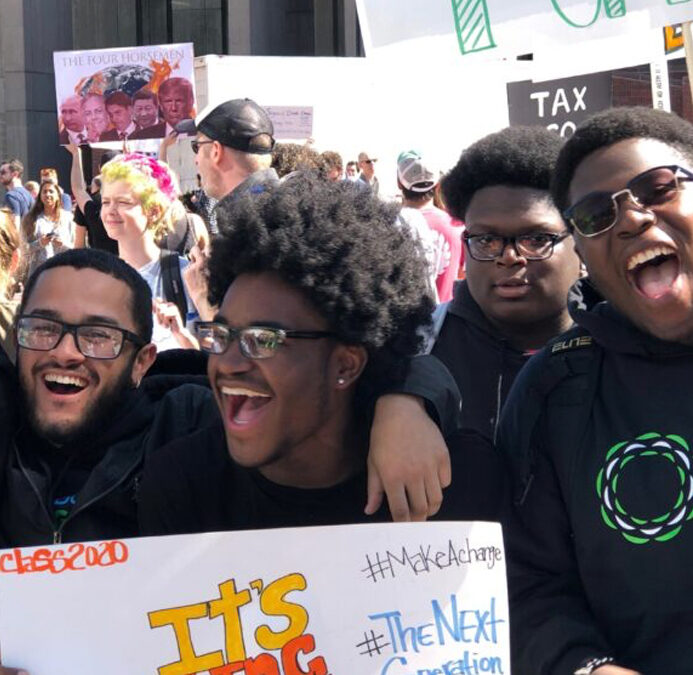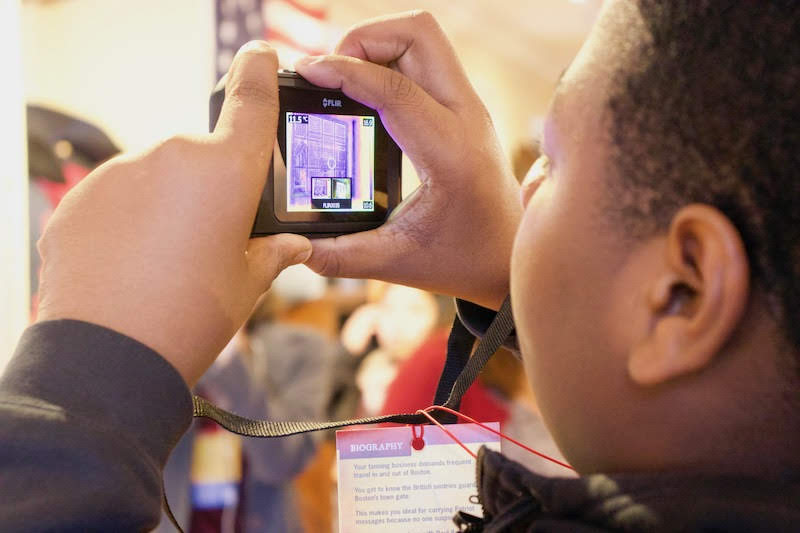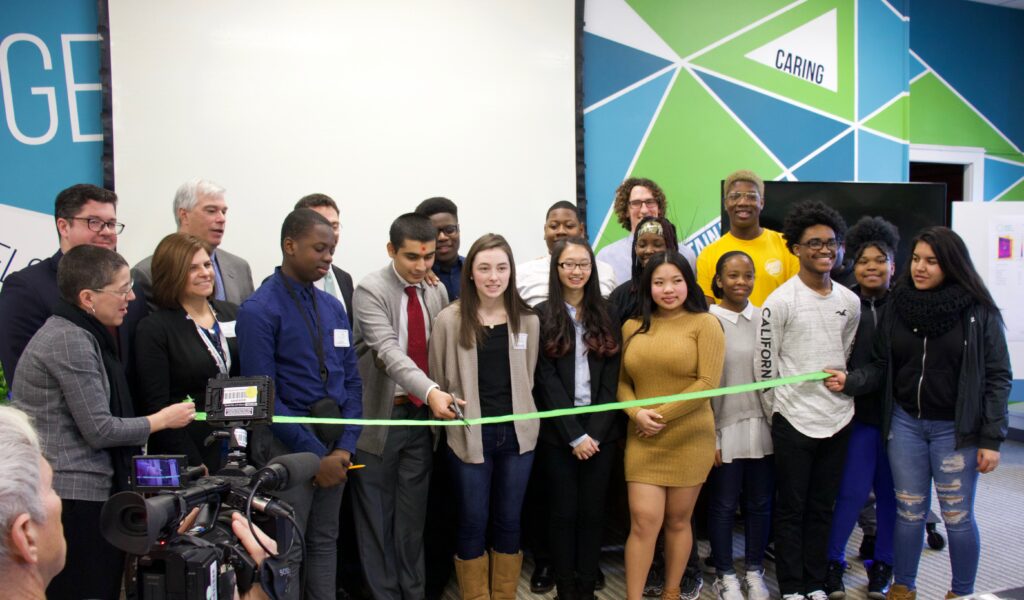By. Chamberlain Segrest
A student unlocks what appears to be a shipping container parked next to the outdoor classroom at Boston Green Academy (BGA). She nods her head toward the raised beds sitting about 10 feet away and says, “Don’t worry, we still grow food the traditional way, but we needed a way to increase our yield so we could expand our business.” And increase their yield they did! Inside that shipping container are over 88 vertical panels supporting heads of lettuce, kale, and radishes. The student pulls up an app on her phone and explains that the system alerted her class that the pH was too high for about one-quarter of the panels. “We actually adjusted the pH level from inside the classroom using this app, but I don’t know, I just wanted to come and check on them in person.” She explains they are working on a business model to sell the produce to economically sustain their farm, as well as give a portion back to their community. Assured the pH has returned to normal, she clicks off the computer screen on the wall, locks the shipping container, and heads back into school for her next class.
Experiences like this are the norm at BGA, an innovative grade 6-12 school in the Boston Public Schools system that equips students with the skills they will need to be sustainability leaders and contribute to the burgeoning green economy. The student in the opening story belongs to one of our signature programs, the Environmental Science & Technology career and technical education (CTE) pathway program for ninth- through twelfth-grade students. BGA has the distinction of being the only district school with this focus and opportunity. Graduates of this pathway are prepared to continue their education in college or enter the workforce prepared for jobs in a variety of STEM career fields. Using our school building and local community as living laboratories, the CTE program is solution oriented and builds community through action.
Partners Provide Valuable Learning Experiences
Our CTE pathway program is fortunate to have a dynamic program advisory committee comprised of local environmental science and technology experts who develop and coordinate student experiences that build STEM skills through real-world projects in the community. For example, a committee member who is an Energy Manager for the City of Boston connected our tenth-grade class with Revolutionary Spaces in regard to their plans to renovate and better insulate the Old State House’s building envelope. We had just purchased a set of thermal imaging cameras and the committee member thought this would be a great opportunity for students to use the cameras to record thermal images of the building’s envelope in preparation for the renovations. Students spent the next couple weeks researching historic building envelope updates, recording thermal images of windows and doors at the Old State House, and then writing a report to be used during the renovations. This initial project spurred an ongoing partnership with the City of Boston to support building envelope thermal imaging of other historic municipal buildings in the city.
Our CTE pathway students are also actively engaged with Boston-based colleges and universities. A recent partnership involves the University of Massachusetts, Boston and their new Stone Living Laboratory (SLL). SLL is an innovative coastal resiliency laboratory located within the Boston Harbor Islands park system. The lab develops and tests nature-based and hybrid infrastructure to better manage the impacts of sea level rise. This year, juniors from our CTE pathway program will engage with SLL through their citizen science program. BGA adopted Carson Beach as our test site and students will collect data on the changing beach profile, especially following major storms. Students will continue the citizen science work into their senior year and eventually graduate with college credit from the university.
Mentors, Training, and Internships Inform Potential Career Pathways
Throughout their four years in the CTE pathway program, students are introduced to and mentored by professionals who work in innovative green technology and sustainability companies in Boston. These mentors share their career trajectories and expertise with students in a number of ways. For example, career panels are a frequent event for CTE pathway students. Recent panels included Greentown Labs, a community of Boston-area, climate-tech startups working to solve the climate crisis, and Indigo Ag, a local company harnessing technology to foster sustainable agriculture. Career exposure via career panels and job fairs for freshmen and sophomores turns into job shadowing opportunities during junior year and culminates in a six-week internship during senior year. This year, seniors interned with Greentown Labs, Arup Engineering, Gensler Architects, and the Massachusetts Department of Environmental Protection, to name a few.
Training and career-based credentials are also important components of the CTE pathway program. For example, our eleventh-graders are trained to take and pass the LEED Green Associates exam. The training includes partnering with industry leaders in green building, architecture, engineering, and construction to learn how to build more sustainable infrastructure. Students are currently working with Gensler Architects to learn the 3D design program SketchUp and create visionary cities using this software. Students also receive credentials in OSHA 10, OSHA 40, ArcGIS, CPR, and first aid, and are prepared to take the Massachusetts Class II Municipal Wastewater Treatment Plant Operators and Massachusetts Grade I Drinking Water Treatment Exams administered by the State of Massachusetts.
Budding Entrepreneurs at BGA
As of February 2021, our CTE pathway students have had an opportunity to pilot a business of their own using our brand new Freight Farm! Freight Farms is the world’s leading producer of container farming technology – and just happens to be located in Boston. We purchased their newly designed model named “The Greenery” through a capital grant we were awarded from the state. The Greenery is a high-tech, hydroponic farm bundled inside a shipping container that can support between 3,000 – 9,000 mature plants each growing cycle. Students are developing a sustainable business around the farmed microgreens and have already created their brand (Gladiator Greens) and tagline (“Fighting Hunger, Building Community”). Their next steps include marketing and distribution research and outreach to local food banks in the hopes of diverting a set amount of produce each month to help fight hunger in the community.
BGA is preparing to graduate its first cohort of CTE pathway students, whose next stops include Benjamin Franklin Institute of Technology, University of Massachusetts, Boston, Northeastern University, Wentworth Institute of Technology, and Digital Ready Year 13, among others. We couldn’t be prouder of our seniors and everything they’ve accomplished. If you’re interested in learning more about our students, our school, and our future plans, please visit our website at www.bostongreenacademy.org.
Author Bio
Chamberlain Segrest has served as the Director of Sustainability and Innovation at Boston Green Academy BGA) for the last nine years and absolutely loves the work and the BGA community. She views the Environmental Science & Technology career and training education pathway as a model that empowers students to create change in their local community while breaking down the barrier between high school and the post-secondary world. She is always looking to expand the green partnerships and opportunities for students at BGA, so please reach out to her if you would like to learn more! csegrest@bostongreenacademy.org



